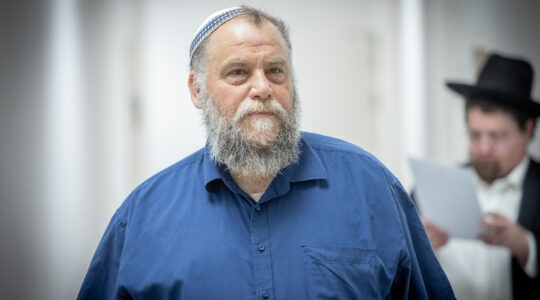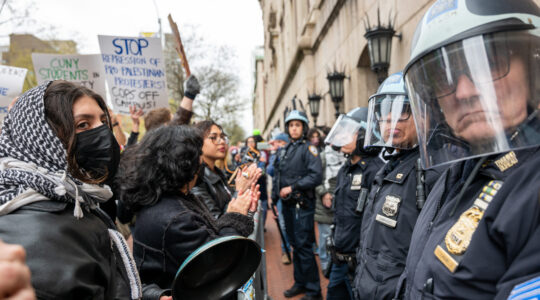
House Speaker John Boehner (R-Ohio) was among the congressional leaders to take the stage at the 2011 AIPAC Policy Conference. (AIPAC)
WASHINGTON (JTA) — The centerpiece of AIPAC’s annual conference, the gala banquet, is a little like the Oscars: The room is full of celebrities, speeches are interspersed with emotional video montages, the highlight that everyone’s waiting for comes at the end, and the main event is followed by exclusive after-parties.
There are a few differences, too, of course.
Instead of Hollywood’s elite, it’s the political elite that shows up. This year, 67 members of the U.S. Senate and 286 members of the House of Representatives came, along with a smattering of Obama administration officials, Knesset members and diplomats from around the world. Former NBA All-Star Allan Houston helped emcee the evening.
At the after-parties, instead of inebriated celebs showing off their evening gowns, or what’s under them, Newt Gingrich, Rep. Michele Bachmann (R-Minn.) and Rep. Debbie Wasserman Schultz (D-Fla.) hosted parties in conference rooms with kosher brownies and chocolate chip cookies, and the buzz was about the next presidential election.
And unlike the Oscars, the AIPAC dinner is a little less exclusive: As long as you pay your registration fee, you get a seat at a table. This year as every year, the dinner for 10,000 — approximately 1,500 of whom were bumped to a satellite ballroom — marked the world’s largest single kosher meal. The menu? Stuffed Cornish hen.
* * *
There was something odd about the timing of this year’s conference.
As usual, it precipitated a visit to Washington by the Israeli prime minister. With the Middle East in turmoil and the Israeli-Palestinian relationship on the brink, the United States was pressing for some kind of new momentum from Benjamin Netanyahu in the weeks leading up to his U.S. visit. President Obama couldn’t very well not meet with the Israeli prime minister while he was in town, but the administration wanted something more than a photo op at the White House.
Then Netanyahu went to senior congressional leaders to ask to address a joint meeting of Congress, and it looked as if Netanyahu was going to outline his vision for peace — until, that is, the Palestinian Authority decided to sign a unity pact with Hamas.
Obama, not to be pre-empted, scheduled a major Middle East policy speech two days before the conference was to begin and a day before his scheduled White House meeting with Netanyahu.
The result was that neither leader offered much news at AIPAC itself.
Obama made headlines before the conference when he said in his May 19 speech that Israeli-Palestinian negotiations should be based on the 1967 lines, with mutually agreed land swaps. He couldn’t very well make another major policy speech three days later at AIPAC, so instead he used his address Sunday morning to clarify his earlier remarks and deliver some red meat to the pro-Israel audience about Iran, Hamas and U.S.-Israeli military cooperation.
Netanyahu, knowing that he’d be addressing Congress on Tuesday, likewise couldn’t really make news when he addressed the conference Monday night — not least because most of Congress was there at the AIPAC dinner. Instead he advertised his speech to Congress the following morning.
When Netanyahu spoke Monday, he got bigger cheers than Obama had a day earlier. He also had more hecklers. Obama only had one line that elicited a smattering of boos. Obama was interrupted three or four times by hecklers, who quickly were dragged out of the cavernous hall and drowned out by thunderous applause and, at one point, chants of “Bibi! Bibi!”
* * *
AIPAC, grappling with America’s changing demographics, is and reaching out big time to minorities.
Monday night’s dinner featured lots of black-and-white optics: Houston, now the assistant general manager of the NBA’s Knicks, joined Betsy Berns, who writes guides for women on watching sports, to crack wise about hoops and Israel and get sincere about AIPAC. They talked about last year’s tour of Israel by 10 current and former NBA pros.
Then there was the parade of student leaders, which started with the leader of the student body at Morehouse College, a historically black school. The evening’s convocation was delivered by a black Baptist preacher from Detroit and a Conservative rabbi from New Jersey. They hugged and invoked the civil rights era.
Finally, there were the black and white leaders who spoke at the conference: Obama and Netanyahu.
* * *
This was AIPAC’s largest-ever conference. A decade ago, AIPAC leaders noted, the conference fit into a single hotel ballroom. Today, Washington’s largest convention center could barely fit them all. With more than 10,000 attendees, the college students were put in a separate banquet hall downstairs but linked to the main hall by video.
The larger-than-usual congressional delegation comprised more than the two-thirds of the Congress. Among those on hand were a couple of surprises considering their past fraught relations with the lobbying group: Reps. Donna Edwards (D-Md.), Jim Moran (D-Va.), Nick Rahall (D-W.Va.) and Sen. Rand Paul (R-Ky.).
On Tuesday, thousands of activists headed to Capitol Hill for lobbying, with meetings in all 100 Senate offices, and 426 out of 435 House offices.
* * *
What was missing from AIPAC?
Obama did not, as some had hoped, announce a planned visit to Israel.
Commentator Peter Beinart noted that with myriad sessions devoted to the so-called Arab Spring, AIPAC neglected to invite any Arabs to discuss it.
There were some voices of dissent, but they were mostly outside, shouting slogans at conventioneers as they hurried from one air-conditioned building to another through Washington’s oppressive late-May humidity. The protesters came on foot, by bike and in cars, and one group carried a large effigy of what looked like E.T. wearing a kaffiyeh. His position on the debate over Israel wasn’t clear.





